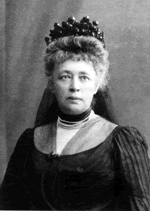Bertha von Suttner’s Nobel Peace Prize


Stories can change the world. Consider, for example, the 1888 anti-war novel Lay Down Your Arms (Die Waffen Nieder) by Baroness Bertha von Suttner of Austria. This melodrama was the best-selling book of the entire nineteenth century and in 1914 was made into one of the first anti-war movies. Its heroine suffers endless tragedies from the wars of the mid-19th century. The novel ran to more than 35 editions and was translated into more than a dozen languages. In it Suttner described arms races through this verse:
My armaments are defensive,
Your armaments are offensive.
I must arm because you must arm,
Because you arm, I arm.
So we must arm,
We arm more and more
Leo Tolstoy wrote to the author, praising her ability to rally readers to her cause and comparing her to Harriet Beecher Stowe, whose book Uncle Tom’s Cabin had instigated the movement to emancipate American slaves. Suttner had sent the book to Tsar Nicholas II of Russia, who was so impressed that he consulted at length with another pacifist, the Russian writer Johann Bloch. In a six-volume work Bloch argued that because of new technologies, including the explosives invented by Alfred Nobel, no war could be won anymore by either side.
Evidently Bertha von Suttner and Bloch convinced the Tsar, if not all of his courtiers. He issued a peace manifesto in August 1898 calling for an international conference. He concluded that it was his duty to “stop these never ending armaments, and to search for means to stop the evil that threatens the whole world.”
Unfortunately, the idea of ending war was widely regarded as ludicrous and naïve. When Suttner met with the Russian Foreign Minister to propose the creation of a Russian peace society, he did not accept the idea, insisting instead that “the Tsar and the government now themselves are leading the movement.” Indeed, Lay Down Your Arms was forbidden in Russia, and the Tsar’s original manifesto was watered down. Instead of seeking an end to war, the program was changed to merely ban certain explosives and “humanize“ war. Many Europeans were also skeptical about the peaceableness of the Tsar’s intentions, for he was simultaneously russifying Finland and conceivably was only trying to get the other powers to stop arms production so he could afford some heavy military expenses of his own.
Nevertheless, the peace conference went ahead, opening in The Hague on the birthday of Nicholas II, May 18, 1899 and concluding on June 29. Twenty-six States from Europe, the United States, Mexico, China, Japan, and Siam participated. There were three commissions: Disarmament, Rules of War, and Arbitration. Nothing came of the disarmament commission. The second commission banned dumdum bullets, gas warfare, and the throwing of bombs from balloons for five years. Soon airplanes were developed, and the five-year moratorium was never extended. The third commission, however, did yield a useful result: a convention on the peaceful arbitration of international conflicts.
Before her marriage, Bertha von Suttner had once been employed briefly as a secretary and household manager by Alfred Nobel, the Swedish industrialist who became rich from developing dynamite. They had formed an intense friendship that endured throughout their lives, though they met only twice during the next twenty years. They corresponded by post throughout the time when Suttner was becoming famous for her leadership in the peace movement.
Nobel praised her effusive writing highly, though he did not quite believe in her approach. He, too, wanted to put an end to war, but he believed that his own method would be more successful than hers: By making munitions available, he would show the world that these new weapons were too powerful ever to be used, so that States would henceforth call off their battle plans. Bertha von Suttner, on the other hand, called for such measures as arbitration of disputes. Besides writing her famous novel, she became recognized as the main leader of the European peace movement. She founded an Austrian peace organization, participated in countless conferences, lectured widely, and edited the international peace journal, Die Waffen Nieder! — the same title as her book.
Throughout this time the two friends debated in their correspondence about the value of peace movement propaganda, but Nobel kept an open mind. He wrote to her, “Inform me, convince me, and then I will do something great for the movement.” As she kept him posted about these activities, he responded by sending generous cheques. She pleaded in a letter for him to endow the movement in some way that would survive his death, and two months later he revised his will, stipulating that the income from most of his estate would fund prizes for achievements in scientific, literary, and peace work. She did not know that he had made such a plan.
Alfred Nobel died in 1896. The first Nobel prizes were given in 1901, and in 1905 the Peace Prize was awarded to Baroness Bertha von Suttner. She had not saved the world — that remains for us to do — but she had certainly changed it. Her example shows all of us what a storyteller can accomplish.



0 Comments:
Post a Comment
<< Home